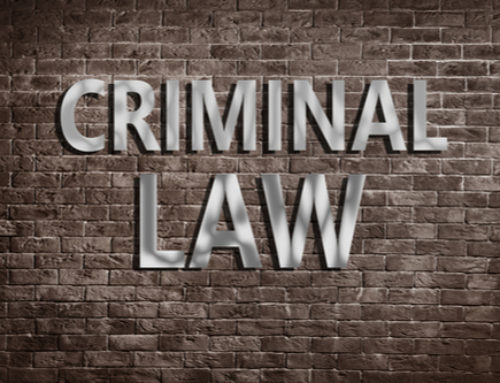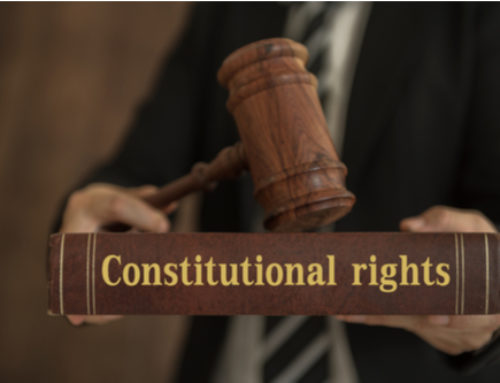If you have been arrested and face trial for a misdemeanor or felony (or perhaps multiple misdemeanors or felonies) in Arizona, you need to have a clear understanding of what will happen during your case. This starts with understanding the terminology involved. Here is an introduction to 15 key terms you are likely to encounter at different stages of your case:
During and After Your Arrest
When the police arrest you for a crime, they must follow specific legal procedures, and they must observe your constitutional rights at all times. If they fail to do so, this failure may provide you with the defense before or during the trial:
1. Reasonable Suspicion
Under the Fourth Amendment to the U.S. Constitution, the police cannot conduct a stop unless they have reasonable suspicion that a person has been involved in a crime. If you were stopped without reasonable suspicion (i.e., based on your ethnicity, race, or sex), any evidence obtained after your stop might be inadmissible in court.
2. Probable Cause
Before conducting a search or executing an arrest, the police must establish probable cause. This is a higher standard than reasonable suspicion, as the stakes during searches and arrests are generally higher. Like the lack of reasonable suspicion, a lack of probable cause may lead to evidence being deemed inadmissible in court.
3. Miranda Warning
Before conducting a custodial interrogation (more on this below), the police must read the Miranda warning. The Miranda warning notifies suspects of certain key constitutional rights (i.e., the right to remain silent and the right to a criminal attorney). Failure to timely read the Miranda warning can lead to confessions and other evidence being deemed inadmissible as well.
4. Custodial Interrogation
For the protection of the Miranda warning to apply, the police must conduct a custodial interrogation. This means that you must be in custody (you must reasonably believe that you are not free to leave), and the police must be questioning you in connection with an alleged crime.
5. Charge (or Charges)
If probable cause exists (or if it appears that probable cause exists), prosecutors will move forward with pressing charges. A charge is a formal allegation of a crime filed in Arizona state court. Once you have been formally charged, then your case will be set on the path toward trial.
Pre-Trial Criminal Procedure
Once you are charged with a crime, the criminal justice process begins to move swiftly. You need to make sure you know what comes next, and it will be important for you to begin working with an experienced Phoenix criminal defense lawyer as soon as possible:
1. Initial Appearance
The first time you go to court will most likely be for your initial appearance. During your initial appearance, you will be informed of the charge(s) against you; you will be advised of your constitutional rights, the judge will decide as to whether there is probable cause for you to be detailed, and (assuming probable cause exists) the judge will determine whether you should be released on your own recognizance or released on bond.
2. Bond
If you are released on bond, you will be required to pay for your freedom pending trial. There are several factors the Arizona courts consider in deciding whether to allow a defendant to post a bond. As outlined in Section 13-3967 of the Arizona Revised Statutes, these factors include (but are not limited to):
- The views of the victim;
- The nature and circumstances of the offense charged; and,
- Whether the accused has a prior arrest or conviction for a serious offense or violent or aggravated felony.
3. Plea Bargain
If you are at risk of being found guilty at trial, it may be in your best interest to negotiate a plea bargain. This is a deal that you negotiate with the prosecutor’s office that typically involves accepting liability for a crime in exchange for a reduced charge and/or a reduced sentence. Obviously, this needs to be done extremely carefully; before you even consider a plea bargain, you will want to discuss your options with your attorney in detail.
4. Discovery
Prosecutors have an obligation to share exculpatory evidence with defendants and their defense counsel. Still, they are not required to voluntarily hand over all of the evidence they have in their possession. To obtain this additional evidence, the defendants must request it through the discovery process.
5. Motions and Hearings
A motion is a means of submitting a formal request to the court. A hearing is a court procedure in which the judge considers a motion and additional evidence and arguments from each of the parties. As your case proceeds toward trial, your attorney may file motions to suppress evidence, motions to dismiss, and various other types of motions to try to steer your case in your favor.
Your Criminal Trial
If you have not negotiated a plea bargain or had your charges dismissed, eventually, your trial date will arrive. When it does, you and your attorney must be prepared to do everything you can to avoid a disastrous result:
1. Burden of Proof
In criminal cases, the prosecution always has the burden of proof. This means that the prosecution must prove you are guilty (beyond a reasonable doubt), and if it doesn’t, you are entitled to walk free.
2. Acquittal
A “not guilty” verdict results in an acquittal. If you receive an acquittal, your charges will be dropped, and you will be able to begin the process of restoring your normal life.
3. Mistrial
If the jury cannot reach a verdict, then the judge will order a mistrial. However, this does not mean your case is over. The prosecutor’s office may choose to try again, and being forced to stand trial again after a mistrial does not violate the Fifth Amendment’s Double Jeopardy Clause.
4. Conviction
A “guilty” verdict results in a conviction. If you are convicted, your case will proceed to sentence, and you will need to work with your attorney to determine if you have grounds to file an appeal or a petition for post-conviction relief.
5. Sentencing
At sentencing, the judge will impose punishment for the crime(s) you were convicted of. Standard forms of punishment include fines and jail time, though various crimes can carry additional sentences.
Request a Free and Confidential Consultation with Criminal Defense Lawyer in Phoenix or Tempe, AZ
Have you been arrested for a crime in Phoenix or Tempe, AZ? To discuss your case with a criminal defense lawyer and former judge, Mark Weingart, call 480-405-7922 or request a free consultation at The Weingart Firm today.






